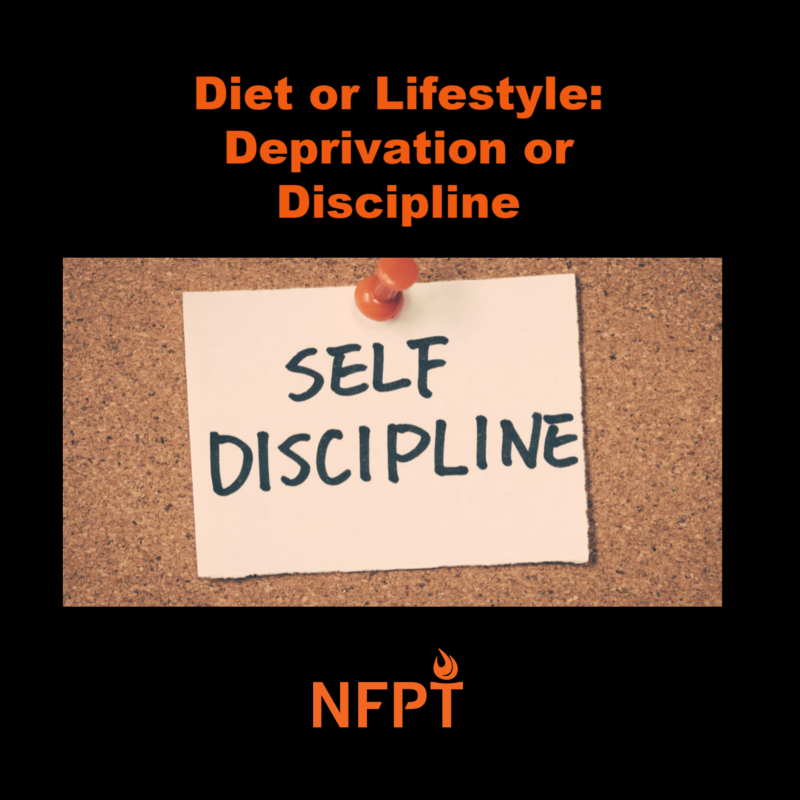
Successful and sustainable weight loss is a long-term process. A personal training client must choose every day to engage in the behaviors that will lead them to their goals, and they must continue to make those choices in order to maintain their progress. Oftentimes when adopting new diet and activity habits, clients can feel a sense of deprivation regarding the foods they previously ate or the reduction in their Netflix watching. The key to a client successfully and sustainably achieving their weight loss goals can be summed up in one word: choice.
Locus of Control
Choice is the difference between discipline and deprivation. Discipline develops from an internal locus of control. Feelings of deprivation develop from an external locus of control. A locus of control can be defined as the degree to which someone believes they have control over the outcome of events in their lives.
A person with an internal locus of control believes they are in control of their own life, and their decisions and actions determine the outcome of events in their life. These individuals believe that challenges to their abilities can be overcome with effort and time. A person with an external locus of control believes that their life is controlled by outside factors, and that they have little to no influence over the events in their life. These individuals struggle when it comes to weight loss as, by definition, they do not believe that their environment or choices are within their control.

The majority of individuals who adopt weight loss diets do so for a reason that does not include an investment in their personal health. The most common reasons are to be “ready” for an upcoming event, an upcoming warm-weather season, or they were told to by a healthcare provider. Because their choice to become healthier is not the main reason they begin this journey, they will often “put up with” the exercise or nutrition recommendations they are told to follow. There is usually some underlying sense of aggrievement in engaging in these new behaviors.
Word Choice Matters
When clients are trying to lose weight, many of them will often refuse unhealthy food by saying, “I can’t. I’m on a diet.” A diet, as most clients think of it, is a temporary intervention that has a defined endpoint at which they can resume their “normal” habits. Whether it’s to reduce the social pressure of eating certain foods at a social event or they truly feel as if they are forbidden by their temporary intervention, the result is the same: no ownership of their decision.
This external locus of control frequently results in feelings of deprivation and frustration, as the client feels compelled to abide by their new diet. These feelings are a time-bomb waiting to manifest as a binge, which is the first step in the cycle of yo-yo dieting.
A small, yet powerful, example of how a client can demonstrate their choice to engage in healthy behaviors can be seen in the language they use to refuse unhealthy food choices.
“No, thank you. I don’t eat that.”
The use of the word “don’t” rather than the more commonly used “can’t” demonstrates choice. The vast majority of clients with weight loss goals are adults, fully capable of making their own decisions. Using “don’t” implies the understanding that they can make a different choice, but they elect to make a healthier one because they understand that consistently making these types of decisions will lead them closer to their goals.
Cultivate Discipline
Put simply, discipline comes from the knowledge that the individual can make a less healthy decision, yet chooses not to. Clients look to fitness professionals for guidance, and they will often attribute attaining their goals to their trainer. They discount their own efforts because of their external locus of control, feeling as if they have little to no say over the work they put into their sessions.
It is important to help clients recognize the choices they make, even if they feel like they are not always in control of those choices. Reinforcing the knowledge that clients can control their lives, as well as celebrating their choices toward healthier living, helps them make additional healthy choices.
Fitness professionals should aspire to educate their clients in addition to making them stronger and healthier. The best movement and nutrition educators foster critical thinking skills based on scientific principles, rather than simply telling their clients or students how to move or eat.
Teaching individuals how to make their own choices, rather than simply giving them guidelines to follow (though guidelines and protocols can be necessary to start the learning process), is important in developing self-efficacy. Self-efficacy is paramount in developing an internal locus of control, which cultivates discipline.
Discipline is the foundation of long-term lifestyle change. Clients who connect healthy behaviors with their desired outcomes are better able to sustain and maintain their weight because it is their choice to engage in these behaviors. Their belief that their choices determine the outcomes of events in their lives – their internal locus of control – empowers them to make decisions aligned with their goals.
References:
- Adolfsson, B., Andersson, I., Elofsson, S., Rössner, S., & Undén, A.-L. (2005, January). Locus of control and weight reduction. Retrieved from https://www.ncbi.nlm.nih.gov/pubmed/15590223
- Anastasiou, C. A., Fappa, E., Karfopoulou, E., Gkza, A., & Yannakoulia, M. (2015, August). Weight loss maintenance in relation to locus of control: The MedWeight study. Retrieved from https://www.ncbi.nlm.nih.gov/pubmed/26057439
- Neymotin, Nemzer, & R., L. (2014, September 19). Locus of Control and Obesity. Retrieved from https://www.frontiersin.org/articles/10.3389/fendo.2014.00159/full






